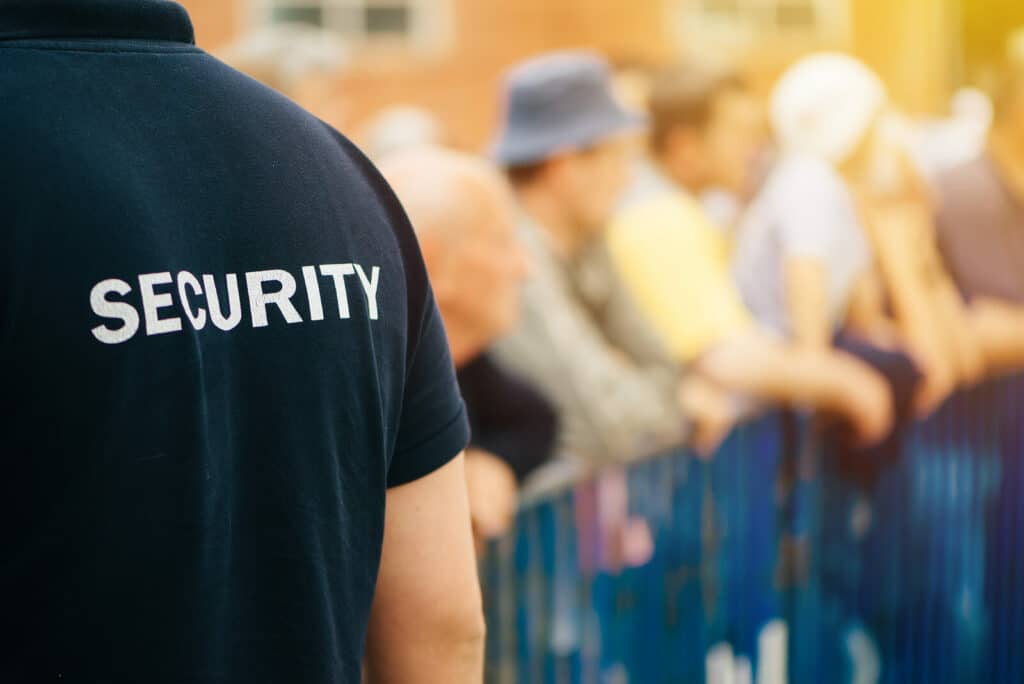For any event—of any size, in any city and any venue—security is an important part of ensuring success. But making sure your attendees and their property are safe and secure can be a complicated task. Use this 101 guide as a starting-point to help you develop a security plan for your next event.
Why Is Event Security Important?
Event security is important for several reasons:
- Having a comprehensive security plan in place reduces the risk that attendees will be injured.
- It reduces the risk of criminal activity, such as theft or property damage.
- It helps prevent accidents.
- It helps manage the crowds of people who attend the event.
Good event security keeps people safe, helps the event run more smoothly, and enhances everyone’s enjoyment. It’s a key part of what makes an event successful. If you’re planning and running an event, it’s your responsibility to ensure the safety of participants and attendees. Having a comprehensive security plan in place helps you do that.
Event security has long been a key issue, but it’s mostly remained in the background, out of the public eye—until recent years. Active shooter situations like those at an Orlando nightclub and a Las Vegas concert have brought event security issues to the foreground and highlighted the vulnerability of crowds. These tragedies have reinforced the need for strict security protocols at events of all kinds.
Tips for Securing Your Event
Perform a Risk Assessment
Risk assessment is about identifying potential risks, so you can plan to minimize and manage them. Risk assessment should:
- Identify common risks and hazards – Some common risks at any event include theft, property damage, and accidental injury.
- Locate fire exits and fire safety equipment.
- Review the venue’s emergency procedures.
- Identify ways to manage hazards that may result in injury – Potential hazards that can’t be removed should be cordoned off to prevent access.
- Identify all entry points – Separate these into two groups:
- Official attendee access points
- Entry points that need to be secured to prevent unauthorized access to the event
- Designate locations for first aid services.
- Ensure that emergency services have clear access to the venue in case an emergency arises.
In some cases, you may also include risk assessment for guests. If celebrities or other high-profile guests are expected, additional security measures might be needed, like their own entrances and exits and private security guards. Note that some high-profile guests may have their own security services. Find out in advance, so your security teams can coordinate their activities.
Understand Your Venue’s Security
Venue safety should be a key part of your security plan. Different types of venues need different event security strategies. For instance, indoor and outdoor security strategies differ because some outdoor venues don’t have defined entry and exit points.
Start with this checklist:
- Identify all entry points and emergency exits – All access and exit points should be clearly marked.
- All staff and security should be aware of exit and entry point locations – This includes your staff, venue staff, and all of your attendees.
- Confirm that the venue has an established evacuation protocol in case of fire or another emergency – Make sure staff and security are aware of the protocol and can assist with evacuation if need be.
- Ensure that exit points are accessible at all times and that routes to exits are kept clear.
- For outdoor events, establish boundaries, so no one unexpected or unregistered enters.
Narrow Down the Perfect Venue!
Train Your Staff
All your event staff should be familiar with emergency procedures, including any you develop specifically for the event. Staff should have at least some basic training that includes:
- Situational awareness training, including how to identify suspicious individuals and packages
- Crowd management
- Communication and information security
- Fire safety and evacuation protocols
- Whom to contact in an emergency
Understand Crowd Control
In any large crowd, there’s always a chance that something can go wrong. Both staff and security should ideally have experience in dealing with large crowds. They should also be comfortable using their authority to help manage crowds. For instance, by:
- Asking attendees to move on if they’re blocking a door, hallway, or exit
- Monitoring registration lines to make sure people aren’t jumping the line or entering without registering
- Keeping guests away from staff-only areas or cordoned-off hazards
- Keeping track of how many people are in the venue – This is important to ensure the venue doesn’t exceed capacity.
Perfect Your Communication
You and your event staff and security should be able to easily communicate with one another, at any location within the event venue—and preferably outside of it. Cell phones are great, but you may want to provide walkie-talkies for staff, and for security if you haven’t hired a professional security team.
Note that if you hire a security team, it’s not common practice for that team to communicate directly with the people staffing the event. Make sure that your staff know to report any suspicious activity to the security team, rather than confronting attendees.
Prevent Theft
Most event security is geared toward making an event safe for those who attend it. This means also considering the possibility that some attendees may make the event less safe. While it’s not feasible to check out everyone who attends a venue, it is important to understand the most common risks and be on the lookout for red flags.
Big events with lots of moving parts, like trade shows, may have issues with theft. For effective loss prevention, keep an eye out for people who:
- Avoid eye contact
- Watch staff and security closely
- Show little or no interest in booths and exhibits
How to Secure Your Trade Show Exhibit
Lock Down Cybersecurity
Another security issue of note is that of cybersecurity. This is an issue because any company that attends the show wants to know that their sensitive data is safe and secure. While major cyber attacks are rare overall, they’re increasingly common at high-profile events. For instance, at the 2016 Super Bowl, over 50,000 cyberthreats had been discovered by the end of the five-hour final game event.
Of course, the average trade show won’t command anywhere near that degree of attention. But event and trade show planners accumulate large amounts of potentially sensitive data. Much of it is gathered via websites and digital devices, both of which are vulnerable to criminal activity such as phishing and data theft. If your role as event manager or host means you’re handling attendee data, or if the event itself relies on digital technology, it’s worthwhile focusing some attention on cybersecurity.
The average security team is generally not equipped to handle cyberthreats. If cybersecurity is a risk, consider hiring a consultant who can offer security advice, or even a second security team that’s focused on systems and data protection.
Event Security Helps Every Attendee Enjoy Your Event
Event security may not seem as important as raising your registration numbers or skilfully branding your event, but it’s actually crucial. Guests and staff all want to feel safe. That’s when they’ll get their best networking done, when they’ll be most productive, and when ideas can flow freely. With full safety, security, and risk management protocols in place, you’ll be able to handle any problems that arise and ensure that your guests or attendees can enjoy themselves.










